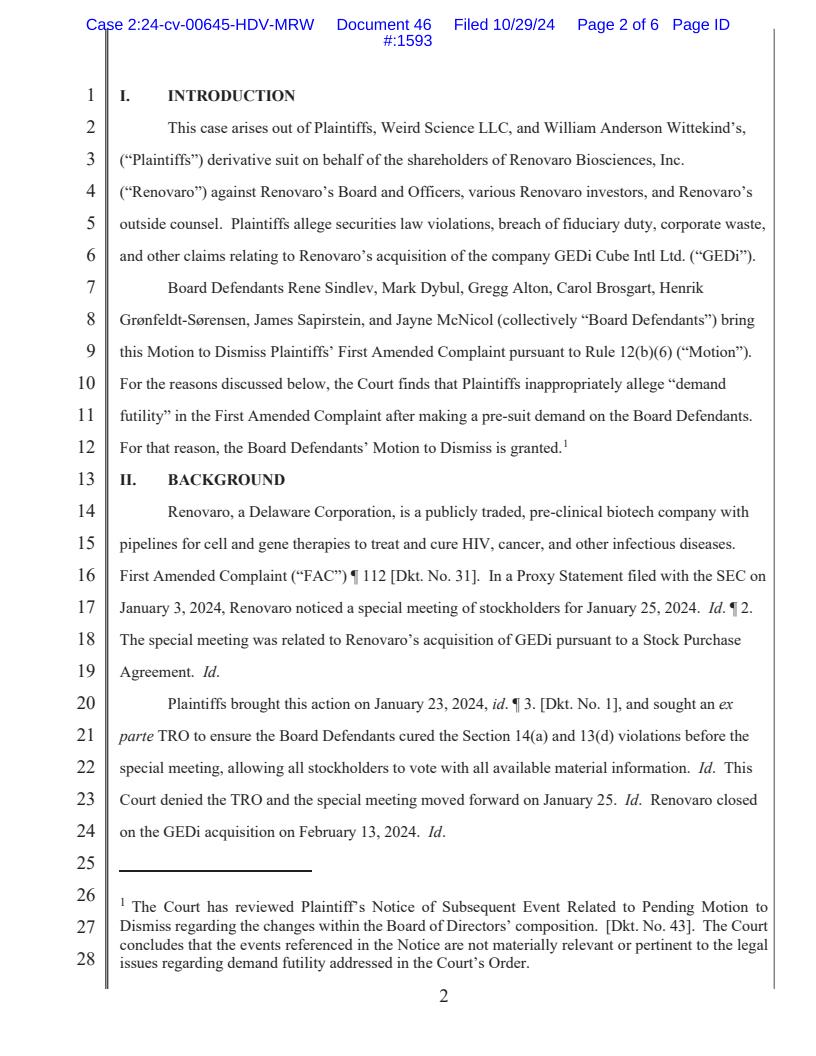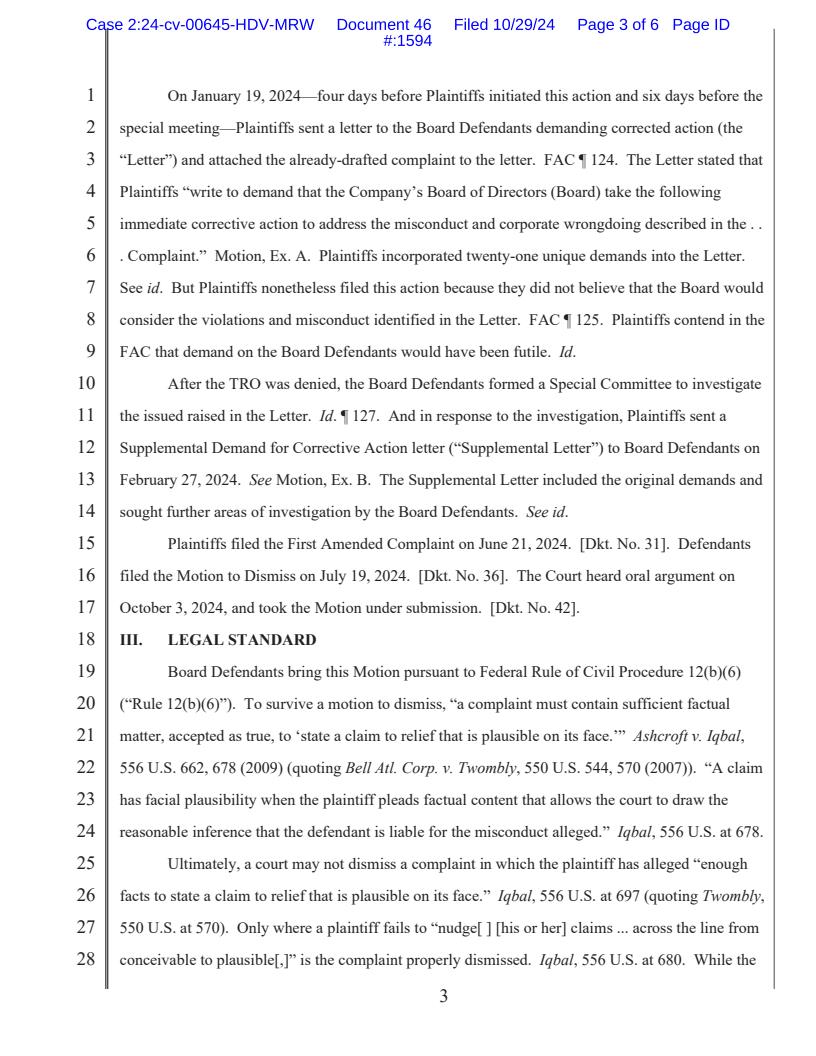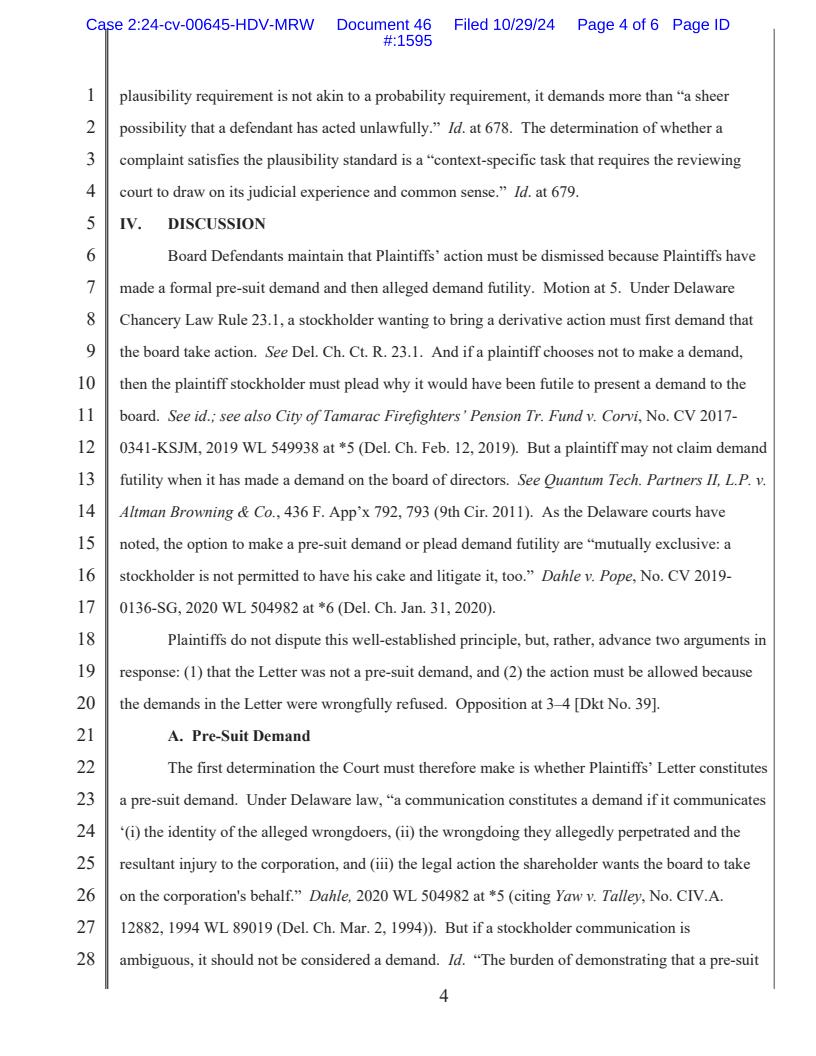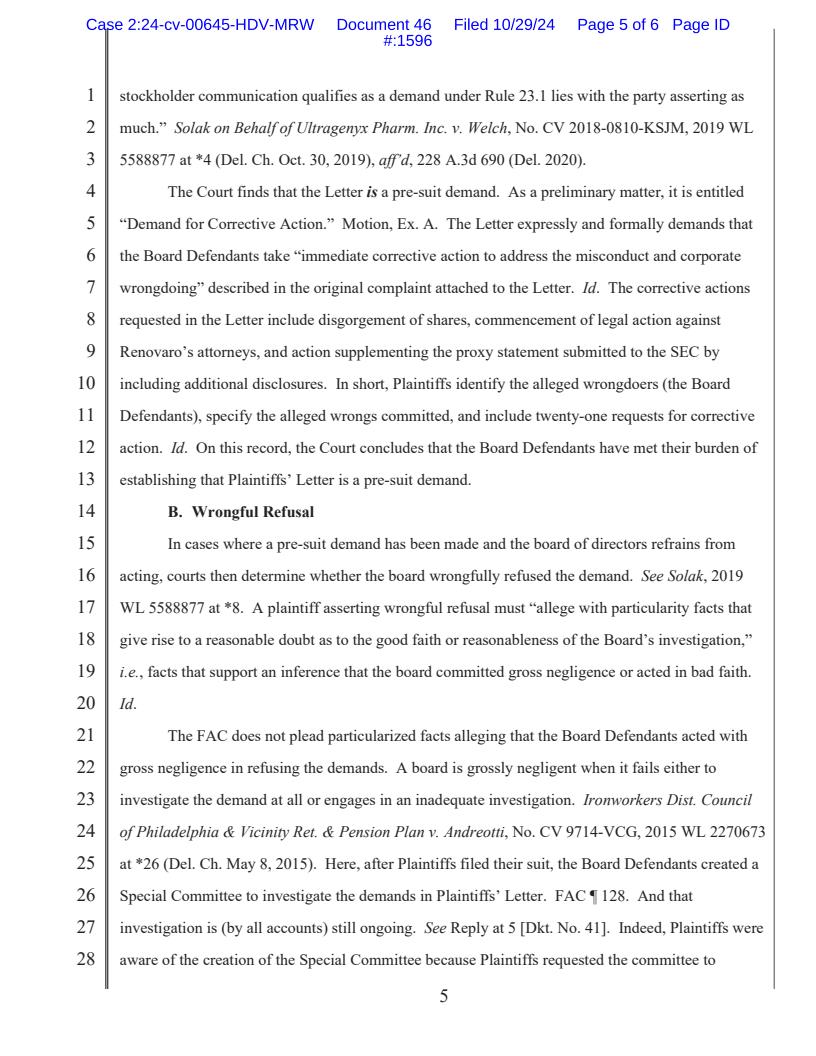Exhibit 28

1 2 3 4 5 6 7 8 9 10 11 12 13 14 15 16 17 18 19 20 21 22 23 24 25 26 27 28 1 UNITED STATES DISTRICT COURT CENTRAL DISTRICT OF CALIFORNIA WEIRD SCIENCE LLC et al., Plaintiffs, v. RENE SINDLEV et al., Defendants. Case No.: 2:24-cv-00645-HDV-MRW ORDER GRANTING DEFENDANTS MOTION TO DISMISS [DKT. NO. 36] JS-6

1 2 3 4 5 6 7 8 9 10 11 12 13 14 15 16 17 18 19 20 21 22 23 24 25 26 27 28 2 I. INTRODUCTION This case arises out of Plaintiffs, Weird Science LLC, and William Anderson Wittekinds, (Plaintiffs) derivative suit on behalf of the shareholders of Renovaro Biosciences, Inc. (Renovaro) against Renovaros Board and Officers, various Renovaro investors, and Renovaros outside counsel. Plaintiffs allege securities law violations, breach of fiduciary duty, corporate waste, and other claims relating to Renovaros acquisition of the company GEDi Cube Intl Ltd. (GEDi). Board Defendants Rene Sindlev, Mark Dybul, Gregg Alton, Carol Brosgart, Henrik Grønfeldt-Sørensen, James Sapirstein, and Jayne McNicol (collectively Board Defendants) bring this Motion to Dismiss Plaintiffs First Amended Complaint pursuant to Rule 12(b)(6) (Motion). For the reasons discussed below, the Court finds that Plaintiffs inappropriately allege demand futility in the First Amended Complaint after making a pre-suit demand on the Board Defendants. For that reason, the Board Defendants Motion to Dismiss is granted.1 II. BACKGROUND Renovaro, a Delaware Corporation, is a publicly traded, pre-clinical biotech company with pipelines for cell and gene therapies to treat and cure HIV, cancer, and other infectious diseases. First Amended Complaint (FAC) ¶ 112 [Dkt. No. 31]. In a Proxy Statement filed with the SEC on January 3, 2024, Renovaro noticed a special meeting of stockholders for January 25, 2024. Id. ¶ 2. The special meeting was related to Renovaros acquisition of GEDi pursuant to a Stock Purchase Agreement. Id. Plaintiffs brought this action on January 23, 2024, id. ¶ 3. [Dkt. No. 1], and sought an ex parte TRO to ensure the Board Defendants cured the Section 14(a) and 13(d) violations before the special meeting, allowing all stockholders to vote with all available material information. Id. This Court denied the TRO and the special meeting moved forward on January 25. Id. Renovaro closed on the GEDi acquisition on February 13, 2024. Id. 1 The Court has reviewed Plaintiffs Notice of Subsequent Event Related to Pending Motion to Dismiss regarding the changes within the Board of Directors composition. [Dkt. No. 43]. The Court concludes that the events referenced in the Notice are not materially relevant or pertinent to the legal issues regarding demand futility addressed in the Courts Order.

1 2 3 4 5 6 7 8 9 10 11 12 13 14 15 16 17 18 19 20 21 22 23 24 25 26 27 28 3 On January 19, 2024four days before Plaintiffs initiated this action and six days before the special meetingPlaintiffs sent a letter to the Board Defendants demanding corrected action (the Letter) and attached the already-drafted complaint to the letter. FAC ¶ 124. The Letter stated that Plaintiffs write to demand that the Companys Board of Directors (Board) take the following immediate corrective action to address the misconduct and corporate wrongdoing described in the . . . Complaint. Motion, Ex. A. Plaintiffs incorporated twenty-one unique demands into the Letter. See id. But Plaintiffs nonetheless filed this action because they did not believe that the Board would consider the violations and misconduct identified in the Letter. FAC ¶ 125. Plaintiffs contend in the FAC that demand on the Board Defendants would have been futile. Id. After the TRO was denied, the Board Defendants formed a Special Committee to investigate the issued raised in the Letter. Id. ¶ 127. And in response to the investigation, Plaintiffs sent a Supplemental Demand for Corrective Action letter (Supplemental Letter) to Board Defendants on February 27, 2024. See Motion, Ex. B. The Supplemental Letter included the original demands and sought further areas of investigation by the Board Defendants. See id. Plaintiffs filed the First Amended Complaint on June 21, 2024. [Dkt. No. 31]. Defendants filed the Motion to Dismiss on July 19, 2024. [Dkt. No. 36]. The Court heard oral argument on October 3, 2024, and took the Motion under submission. [Dkt. No. 42]. III. LEGAL STANDARD Board Defendants bring this Motion pursuant to Federal Rule of Civil Procedure 12(b)(6) (Rule 12(b)(6)). To survive a motion to dismiss, a complaint must contain sufficient factual matter, accepted as true, to state a claim to relief that is plausible on its face. Ashcroft v. Iqbal, 556 U.S. 662, 678 (2009) (quoting Bell Atl. Corp. v. Twombly, 550 U.S. 544, 570 (2007)). A claim has facial plausibility when the plaintiff pleads factual content that allows the court to draw the reasonable inference that the defendant is liable for the misconduct alleged. Iqbal, 556 U.S. at 678. Ultimately, a court may not dismiss a complaint in which the plaintiff has alleged enough facts to state a claim to relief that is plausible on its face. Iqbal, 556 U.S. at 697 (quoting Twombly, 550 U.S. at 570). Only where a plaintiff fails to nudge[ ] [his or her] claims ... across the line from conceivable to plausible[,] is the complaint properly dismissed. Iqbal, 556 U.S. at 680. While the

1 2 3 4 5 6 7 8 9 10 11 12 13 14 15 16 17 18 19 20 21 22 23 24 25 26 27 28 4 plausibility requirement is not akin to a probability requirement, it demands more than a sheer possibility that a defendant has acted unlawfully. Id. at 678. The determination of whether a complaint satisfies the plausibility standard is a context-specific task that requires the reviewing court to draw on its judicial experience and common sense. Id. at 679. IV. DISCUSSION Board Defendants maintain that Plaintiffs action must be dismissed because Plaintiffs have made a formal pre-suit demand and then alleged demand futility. Motion at 5. Under Delaware Chancery Law Rule 23.1, a stockholder wanting to bring a derivative action must first demand that the board take action. See Del. Ch. Ct. R. 23.1. And if a plaintiff chooses not to make a demand, then the plaintiff stockholder must plead why it would have been futile to present a demand to the board. See id.; see also City of Tamarac Firefighters Pension Tr. Fund v. Corvi, No. CV 2017-0341-KSJM, 2019 WL 549938 at *5 (Del. Ch. Feb. 12, 2019). But a plaintiff may not claim demand futility when it has made a demand on the board of directors. See Quantum Tech. Partners II, L.P. v. Altman Browning & Co., 436 F. Appx 792, 793 (9th Cir. 2011). As the Delaware courts have noted, the option to make a pre-suit demand or plead demand futility are mutually exclusive: a stockholder is not permitted to have his cake and litigate it, too. Dahle v. Pope, No. CV 2019-0136-SG, 2020 WL 504982 at *6 (Del. Ch. Jan. 31, 2020). Plaintiffs do not dispute this well-established principle, but, rather, advance two arguments in response: (1) that the Letter was not a pre-suit demand, and (2) the action must be allowed because the demands in the Letter were wrongfully refused. Opposition at 34 [Dkt No. 39]. A. Pre-Suit Demand The first determination the Court must therefore make is whether Plaintiffs Letter constitutes a pre-suit demand. Under Delaware law, a communication constitutes a demand if it communicates (i) the identity of the alleged wrongdoers, (ii) the wrongdoing they allegedly perpetrated and the resultant injury to the corporation, and (iii) the legal action the shareholder wants the board to take on the corporation's behalf. Dahle, 2020 WL 504982 at *5 (citing Yaw v. Talley, No. CIV.A. 12882, 1994 WL 89019 (Del. Ch. Mar. 2, 1994)). But if a stockholder communication is ambiguous, it should not be considered a demand. Id. The burden of demonstrating that a pre-suit

1 2 3 4 5 6 7 8 9 10 11 12 13 14 15 16 17 18 19 20 21 22 23 24 25 26 27 28 5 stockholder communication qualifies as a demand under Rule 23.1 lies with the party asserting as much. Solak on Behalf of Ultragenyx Pharm. Inc. v. Welch, No. CV 2018-0810-KSJM, 2019 WL 5588877 at *4 (Del. Ch. Oct. 30, 2019), affd, 228 A.3d 690 (Del. 2020). The Court finds that the Letter is a pre-suit demand. As a preliminary matter, it is entitled Demand for Corrective Action. Motion, Ex. A. The Letter expressly and formally demands that the Board Defendants take immediate corrective action to address the misconduct and corporate wrongdoing described in the original complaint attached to the Letter. Id. The corrective actions requested in the Letter include disgorgement of shares, commencement of legal action against Renovaros attorneys, and action supplementing the proxy statement submitted to the SEC by including additional disclosures. In short, Plaintiffs identify the alleged wrongdoers (the Board Defendants), specify the alleged wrongs committed, and include twenty-one requests for corrective action. Id. On this record, the Court concludes that the Board Defendants have met their burden of establishing that Plaintiffs Letter is a pre-suit demand. B. Wrongful Refusal In cases where a pre-suit demand has been made and the board of directors refrains from acting, courts then determine whether the board wrongfully refused the demand. See Solak, 2019 WL 5588877 at *8. A plaintiff asserting wrongful refusal must allege with particularity facts that give rise to a reasonable doubt as to the good faith or reasonableness of the Boards investigation, i.e., facts that support an inference that the board committed gross negligence or acted in bad faith. Id. The FAC does not plead particularized facts alleging that the Board Defendants acted with gross negligence in refusing the demands. A board is grossly negligent when it fails either to investigate the demand at all or engages in an inadequate investigation. Ironworkers Dist. Council of Philadelphia & Vicinity Ret. & Pension Plan v. Andreotti, No. CV 9714-VCG, 2015 WL 2270673 at *26 (Del. Ch. May 8, 2015). Here, after Plaintiffs filed their suit, the Board Defendants created a Special Committee to investigate the demands in Plaintiffs Letter. FAC ¶ 128. And that investigation is (by all accounts) still ongoing. See Reply at 5 [Dkt. No. 41]. Indeed, Plaintiffs were aware of the creation of the Special Committee because Plaintiffs requested the committee to

123456789101112131415161718192021222324252627286investigate further issues in PlaintiffsSupplemental Letter. While such an argument could conceivably be made once the results of the investigation are known, the Court concludes thatat this timethere is no basis to argue that the Board Defendants have been grossly negligent in their investigation. In summary, because Plaintiffs submitted a pre-suit demandand cannot at this time plead facts showing that Defendants ongoing investigation amounts to gross negligence, the current action must be dismissed without prejudice. V.CONCLUSION The Motion to Dismiss is grantedand the FAC is dismissed without leave to amend.2Dated: October 29, 2024HernánD. VeraUnitedStatesDistrictJudge2Plaintiffs have already had an opportunity to amend the Complaint, and the Court finds that any further amendment would be futileat this time.nánDVera





